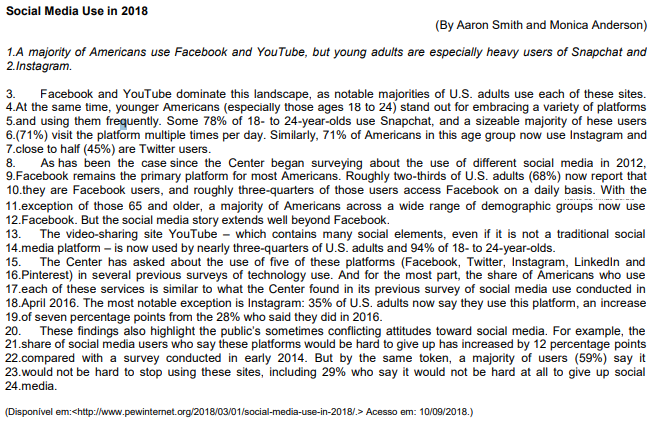Questões de Vestibular de Inglês - Artigos | Articles
Foram encontradas 7 questões
In the excerpt “as the means for fulfilling other possible rights, like happiness” (in the last sentence of the second paragraph), the presence of “the” indicates that people’s happiness depends on them having their civil and political rights respected and guaranteed.
THE STORY OF ELLIS ISLAND
Mass migrations have marked the history of the human race ever since people began to dream of a better life

Disponível em: <https://linguapress.com/advanced/ellis-island.htm>. Acesso em: 7 out. 2019. Adaptado.
TEXTO 01

TEXTO 02

Brazil must legalise drugs – its existing policy just destroys lives
For decades, guns and imprisonment have been the hallmarks of Brazil’s war against the drug trafficking. But the only way to beat the gangs is to stop creating criminals, says a top Brazilian judge
“The war raging in Rocinha, Latin America’s largest favela, has already been lost. Rooted in a dispute between gangs for control of drug trafficking, it has disrupted the daily life of the community in Rio de Janeiro since mid-September. With the sound of shots coming from all sides, schools and shops are constantly forced to close. Recently, a stray bullet killed a Spanish tourist. The war is not the only thing being lost.
For decades, Brazil has had the same drug policy approach. Police, weapons and numerous arrests. It does not take an expert to conclude the obvious: the strategy has failed. Drug trafficking and consumption have only increased. […]
In a case still before the Brazilian supreme court, I voted for decriminalising the possession of marijuana for private consumption. […]
Drugs are an issue that has a profound impact on the criminal justice system, and it is legitimate for the supreme court to participate in the public debate. So here are the reasons for my views.
First, drugs are bad and it is therefore the role of the state and society to discourage consumption, treat dependents and repress trafficking. The rationale behind legalisation is rooted in the belief that it will help in achieving these goals.
Second, the war on drugs has failed. Since the 1970s, under the influence and leadership of the US, the world has tackled this problem with the use of police forces, armies, and armaments. The tragic reality is that 40 years, billions of dollars, hundreds of thousands of prisoners and thousands of deaths later, things are worse. At least in countries like Brazil.
Third, as the American economist Milton Friedman argued, the only result of criminalisation is ensuring the trafficker’s monopoly.
With these points in mind, what would legalisation achieve?
In most countries in North America and Europe, the greatest concern of the authorities is users and the impact drugs have on their lives and on society. These are all important considerations. In Brazil, however, the principal focus must be ending the dominance drug dealers exercise over poor communities. Gangs have become the main political and economic power in thousands of modest neighbourhoods in Brazil. This scenario prevents a family of honest and hard-working people from educating their children away from the influence of criminal factions, who intimidate, co-opt and exercise an unfair advantage over any lawful activity. Crucially, this power of trafficking comes from illegality.
Another benefit of legalisation would be to prevent the mass incarceration of impoverished young people with no criminal record who are arrested for trafficking because they are caught in possession of negligible amounts of marijuana. A third of detainees in Brazil are imprisoned for drug trafficking. Once arrested, young prisoners will have to join one of the factions that control the penitentiaries – and on that day, they become dangerous.
[…]
We cannot be certain that a progressive and cautious policy of decriminalisation and legalisation will be successful. What we can affirm is that the existing policy of criminalisation has failed. We must take chances; otherwise, we risk simply accepting a terrible situation. As the Brazilian navigator Amyr Klink said: “The worst shipwreck is not setting off at all.”
Disponível em: <https://www.theguardian.com/global-development/2017/nov/15/brazil-must-legalise-drugs-existing-policy-destroys-lives-luis-roberto-barroso-supreme-court-judge>